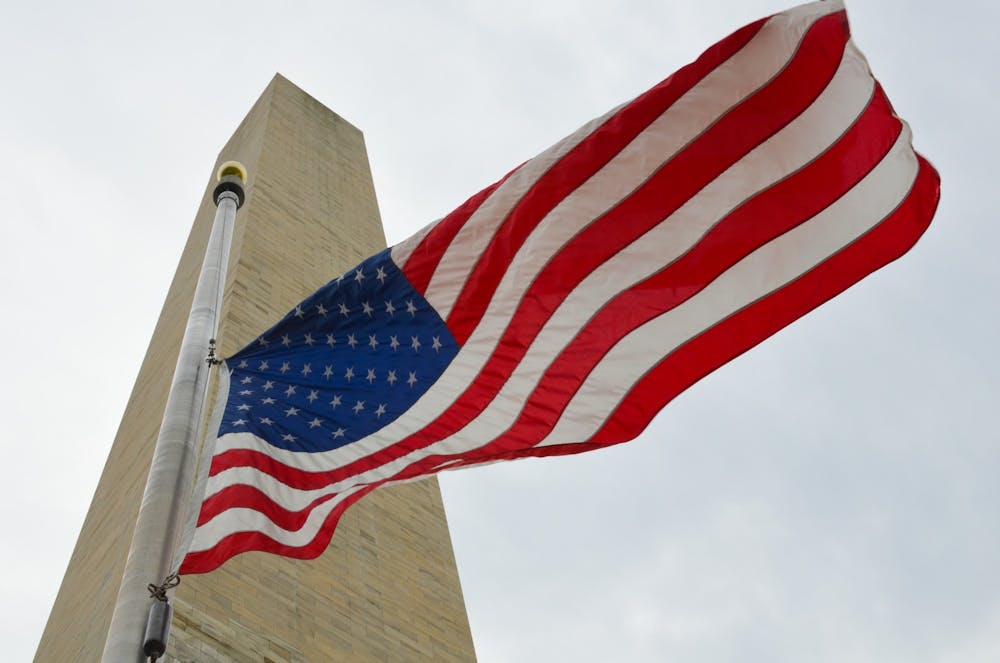Growing up in the New York area (my hometown of Stamford, Conn., is about 45 minutes outside of Manhattan), 9/11 was always a day that was filled with sorrow, commemorative events, memories, and education. Living so close to the city, everyone was impacted by the tragedies of the terror attacks in some way, whether it be through a parent who died in a tower collapse, a traumatic recollection of debris scattering through NYC, or a tale of heroic responses like those of firefighters fraught with lung cancer following the risks they took to save lives in the attacks. As most people from the tristate area understands, everyone around us has their 9/11 story. My own father was caught in traffic on the George Washington Bridge on his way to work at the Twin Towers when the first plane hit — traffic that undoubtedly saved his life, and is the reason why he lived, and why I am at Penn today.
Every year on 9/11, I relived, in great detail, an event that my immediate peers and I were not alive to see. I heard stories of my teachers' vivid memories of their students’ parents not making it home to pick them up from school and of the fear that they felt as phone lines jammed and they couldn’t contact their families. I've watched countless 9/11 documentaries that now serve as regular memorials of the Ground Zero events in my childhood. Despite not being alive on 9/11, it is an event I feel as though I have experienced through the lens of virtually every person I have spent this day with over the past 19 years. However, within the generations that have followed my own, I can see how much “never forget” has not been nearly as prolific as we might have hoped.
This was evident last year, even among people in my own area, when the 9/11 Tribute in Light, a light display projected from Ground Zero to honor the lives of those lost, was almost not displayed due to the COVID-19 pandemic. While backlash from survivors and families affected by the tragedy resulted in the light show occurring, advocacy among people my age was almost nonexistent, despite the wave of political passion that had occupied social media feeds throughout last summer.
The failure of 9/11’s memory to persist in generations who weren't alive to witness the event has also been indicative in light of recent events surrounding the Biden administration’s withdrawal from Afghanistan. You will recall that this war was in a large part initiated by the refusal of the Taliban to extradite members of the terrorist group Al-Qaeda (which was responsible for the coordinating and carrying out of the 9/11 attacks), causing the United States to launch “Operation Enduring Freedom” and invade Afghanistan.
Whatever your opinion on the act of withdrawal itself, there has been almost unanimous agreement among both the president’s supporters and critics that the way in which we fled was disastrous. A recent Pew Research poll recorded 70% of Americans believing the U.S. “mostly failed in achieving its goals in Afghanistan”. The withdrawal left approximately 200 Americans stranded on the ground as the final planes left Kabul and killed 13 American Military members as a result of a suicide bomber, and had been carried out with broken promises and limited physical presence on the part of the president himself.
You would think that this type of butchered political action — which has opened the door for a well-known terrorist organization, whose human rights violations are infamous throughout the world, and cost American lives in the process — would elicit roaring social media criticism from arguably the most politically active generation in recent history. Yet, what have I heard? Crickets. There’s been virtually no criticism of the administration’s response, support for the families of the marines lost in Kabul, or even concern for the decreasing rights for women in Afghanistan among so-called “feminists.”
The apathy and lack of attention towards this particular issue among people my age, is in my opinion, indicative of how little the emotional tolls of 9/11 have been translated to future generations. We were brought into a world where my own parents debated raising a child in the shadow of one of the worst tragedies to occur on American soil. We are not “excused” from the impacts of that and frankly do not have the luxury to be apathetic to the fallout of that just because it was before our time.
The very first conversation I had about the withdrawal from Afghanistan and the rise of the Taliban was in the mixed political company of people from home, all of whom lived through the attacks. What was their first response? “How long before we see another attack like 9/11 all over again?” That frightening and instinctual response by people who bear the burden of those memories is something I want people my age to be forced to be familiar with.
RELATED:
Inside the importance of independence day
An in-depth look at the possibility — and difficulty — of Supreme Court Reform
This is not an issue of politics or generational differences. This is a simple reminder that we do not live in a world where we can afford political apathy on any topics — under any administration. So, take time on the 20th anniversary of the 9/11 attacks to contact people in your life who experienced the day themselves, particularly if you are someone who isn't old enough to remember it yourself. We must “never forget” the lives of those lost that day, and in their honor, it is our very fundamental civic duty to remain vigilant about the fallout of those events.
LEXI BOCCUZZI is a College sophomore studying philosophy, politics, and economics from Stamford, Conn. Her email is abb628@sas.upenn.edu.









